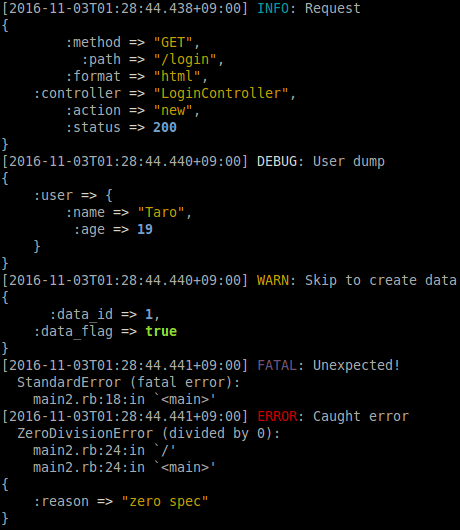README.md in ougai-1.4.1 vs README.md in ougai-1.4.2
- old
+ new
@@ -4,11 +4,11 @@
[](https://badge.fury.io/rb/ougai)
[](https://travis-ci.org/tilfin/ougai)
[](https://codeclimate.com/github/tilfin/ougai)
[](https://codeclimate.com/github/tilfin/ougai/coverage)
-A JSON logging system is capable of handling a message, data or an exception easily.
+A structured JSON logging system is capable of handling a message, structured data or an exception easily.
It is compatible with [Bunyan](https://github.com/trentm/node-bunyan) for Node.js.
It can also output human readable format for the console.
## Installation
@@ -325,83 +325,10 @@
### Screen result example

-## Use on Rails
-
-### Define a custom logger
-
-Add following code to `lib/your_app/logger.rb`
-A custom logger includes LoggerSilence because Rails logger must support `silence` feature.
-
-```ruby
-module YourApp
- class Logger < Ougai::Logger
- include ActiveSupport::LoggerThreadSafeLevel
- include LoggerSilence
-
- def initialize(*args)
- super
- after_initialize if respond_to? :after_initialize
- end
-
- def create_formatter
- if Rails.env.development? || Rails.env.test?
- Ougai::Formatters::Readable.new
- else
- Ougai::Formatters::Bunyan.new
- end
- end
- end
-end
-```
-
-### for Development
-
-Add following code to `config/environments/development.rb`
-
-```ruby
-Rails.application.configure do
- ...
-
- config.logger = YourApp::Logger.new(STDOUT)
-end
-```
-
-### for Production
-
-Add following code to the end block of `config/environments/production.rb`
-
-```ruby
-Rails.application.configure do
- ...
-
- if ENV["RAILS_LOG_TO_STDOUT"].present?
- config.logger = YourApp::Logger.new(STDOUT)
- else
- config.logger = YourApp::Logger.new(config.paths['log'].first)
- end
-end
-```
-
-### With Lograge
-
-You must modify [lograge](https://github.com/roidrage/lograge) formatter like *Raw*.
-The following code set request data to `request` field of JSON.
-
-```ruby
-Rails.application.configure do
- config.lograge.enabled = true
- config.lograge.formatter = Class.new do |fmt|
- def fmt.call(data)
- { msg: 'Request', request: data }
- end
- end
-end
-```
-
### Output example on development
If you modify `application_controller.rb` as
```ruby
@@ -435,9 +362,14 @@
:view => 3.35,
:db => 0.0
}
}
```
+
+## How to use with famous products and libraries
+
+- [Use as Rails logger](https://github.com/tilfin/ougai/wiki/Use-as-Rails-logger)
+- [Customize Sidekiq logger](https://github.com/tilfin/ougai/wiki/Customize-Sidekiq-logger)
## License
[MIT](LICENSE.txt)